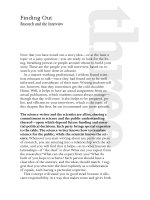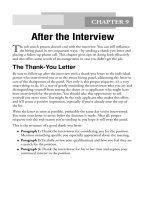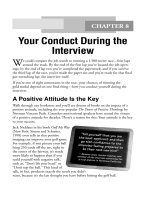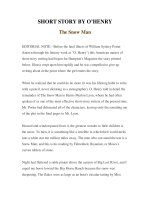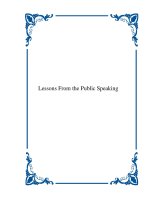WINNING THE INTERVIEW GAME ppt
Bạn đang xem bản rút gọn của tài liệu. Xem và tải ngay bản đầy đủ của tài liệu tại đây (1.61 MB, 210 trang )
TeAM
YYeP
G
Digitally signed by
TeAM YYePG
DN: cn=TeAM
YYePG, c=US,
o=TeAM YYePG,
ou=TeAM YYePG,
email=yyepg@msn.
com
Reason: I attest to
the accuracy and
integrity of this
document
Date: 2005.06.07
05:27:44 +08'00'
Winning
the
Interview
Game
This page intentionally left blank
Winning
the
Interview
Game
EVERYTHING You Need to Know to LAND the JOB
Alan H. Nierenberg
American Management Association
New York • Atlanta • Brussels • Boston • Chicago • Mexico City • San Francisco
Shanghai • Tokyo • Toronto • Washington, D.C.
This publication is designed to provide accurate and authoritative
information in regard to the subject matter covered. It is sold with the
understanding that the publisher is not engaged in rendering legal,
accounting, or other professional service. If legal advice or other
expert assistance is required, the services of a competent professional
person should be sought.
Special discounts on bulk quantities of AMACOM books are
available to corporations, professional associations, and other
organizations. For details, contact Special Sales Department,
AMACOM, a division of American Management Association,
1601 Broadway, New York, NY 10019.
Tel.: 212-903-8316. Fax: 212-903-8083.
Web site: www.amacombooks.org
© 2005 Alan H. Nierenberg.
All rights reserved.
Printed in the United States of America.
This publication may not be reproduced,
stored in a retrieval system,
or transmitted in whole or in part,
in any form or by any means, electronic,
mechanical, photocopying, recording, or otherwise,
without the prior written permission of AMACOM,
a division of American Management Association,
1601 Broadway, New York, NY 10019
Printing Number
10987654321
Library of Congress Cataloging-in-Publication Data
Nierenberg, Alan H.
Winning the interview game : everything you need to know to land the job / Alan
H. Nierenberg.
p. cm.
Includes bibliographical references and index.
ISBN 0-8144-7279-6
1. Employment interviewing. 2. Job hunting. I. Title.
HF5549.5.I6N54 2005
650.14Ј4—dc22
2004029946
To Marsha, Tara, and Erin,
the most important people in my life
This page intentionally left blank
Preface xi
Acknowledgments xv
Part I Let the Game Begin: The Preparation 1
Chapter 1
Prepare for Perfection: Before the Interview 3
How Susan Got the Interview 3
Rules of the Game 4
Game Preparation 5
Behavior-Based Interviewing 12
The Vignette Strategy 14
Elevator Drill 18
Do I Ask Questions? 19
Practice, Practice, Practice 20
Part II Game Plan: Interview
Strategies and Tactics 23
Chapter 2
Find an Opening Connection: Establish Rapport 25
View from Behind the Desk of the
Vice President—Human Resources 25
The Morning of the Interview 27
The Moment of Truth 33
Establishing Rapport 37
vii
CONTENTS
Chapter 3
Meander Through the Middle:
Bulging with Questions 47
Power of Perception 47
Use of Preparation Knowledge 49
Facing an Experienced Interviewer 49
The Inexperienced Interviewer 50
A Discouraging Interviewer 51
Illegal Questions 52
Frequently Asked Questions 53
Neutralize the Age Issue 60
Big Company Small 64
Frequent Job Changes 66
Changing Industries 67
Long-Term Unemployment 69
Overqualified 70
The Interview Game Continues 71
Chapter 4
End with a Lasting Impression:
Any Interviewer, Any Venue 75
The Beginning of the End 75
You Want to Know My Salary? 76
Request for References 78
Document the Interview 79
Thank-You Note 80
Waiting for Feedback 88
Other First-Time Interviewers 89
Other Game Formats 97
viii Contents
Chapter 5
Differentiate Yourself: Second and
Subsequent Interviews 111
Focus 111
A Second Interview 112
Competitive Intelligence 115
How to Use Competitive Intelligence 123
Differentiation Techniques 125
Susan’s Second Interview 140
Part III Winning Move: Enjoy the Moment 141
Chapter 6
Negotiate Final Hurdles: The End Game 143
Reference Checking 143
Receiving an Offer 147
Picking a Start Date 155
Due Diligence 156
Background Check 159
Personality Tests 160
Susan Is Still in the Game 166
Transition from Interviewee to Employee 169
Prepare for the Next Interview Game 176
Appendix 179
Bibliography 181
Index 185
Contents ix
This page intentionally left blank
xi
If you are planning to interview for a job, then you have found the
right book. You may be graduating from high school or college, tran-
sitioning between jobs, or seeking a new job while employed. Re-
gardless of age, level of seniority, or area of expertise, this book will
give you a strong competitive edge over the hundreds or thousands
of competing candidates.
An Overview
Winning the Interview Game: Everything You Need to Know to
Land the Job presents the interview for what it is—a game. There
are many players who affect the outcome of this career game and
you must learn how to deal with each group. Competing candidates
and the judges representing everyone on the other side of the hiring
desk are the major players. You must defeat your competitors and
convince the judges that you are the one who can perform the job
and should get the offer. The role of these players in the interview
game and how you should interact with them are discussed in the
book.
In describing how to prepare for and play the interview game,
Winning the Interview Game: Everything You Need to Know to
Land the Job will provide information not widely known by most job
seekers. You will obtain first-hand knowledge from my experience
on the other side of the interview desk as the current owner of an
executive search firm, with previous experience as a vice president-
human resources and a corporate hiring executive. I was also a job
seeker several times in my career. I have personal experience with
every approach presented in the book and have coached numerous
job seekers whose interview experiences are reflected throughout its
pages.
PREFACE
xii Preface
Although each interview is different, there are many components
that are the same or similar. This book takes advantage of those sim-
ilarities by providing a step-by-step approach to achieve your most
important objective: to convince interviewers that you have the skills
required to perform the job being discussed and that you are excited
about applying those skills at the interviewer’s company.
Empty Your Mind
Before learning a new system of self-defense, an aspiring martial
artist must succeed in removing old habits from his or her mind. The
student needs to absorb the philosophy and choreography of each
class session, learn the basics, and not improvise in the early years
of instruction. Adaptation to the student’s physical abilities will occur
over time. And so it is for this text. Prepare for the interview, de-
velop and execute your strategy, apply proven tactics and you will
be able to adjust your approach for each interview after you master
the basics.
And don’t be afraid to explore every opportunity to play the in-
terview game. Put out of your mind previous negative experiences
and prejudices as well as self-imposed obstacles that may prevent
you from finding a new job. Do not say that you will never work at
another startup, another Fortune 500 company, or another com-
pany that requires driving more than an hour to the office or one
that requires mass transportation to get there. Go with the flow and
you will be pleasantly surprised with the outcome.
Many self-imposed restrictions in a job search usually are based
on previous experiences that went bad. Move through the search
process as quickly as you can and analyze each situation in which
such obstacles are slowing you down. In virtually every interview op-
portunity, you should be able to identify job acceptance criteria that
will be strong incentives to accept a particular position, regardless
of the perceived negatives. For example, if you were a casualty of
a dotcom that ran out of funding, you should now be prepared to
reduce the risks in a new company by insisting on a sign-on bonus
and a higher salary before accepting an offer. Do not refuse to in-
terview for a job that might be a three-hour drive from home. If you
succeed in getting an offer, you have the option to demand tem-
porary living expenses for a period of time, home visits each week-
end, a telecommuting option, and a subsequent relocation with your
family. If the company refuses to satisfy your request, you have the
ultimate power to reject the offer and continue your search.
Very often job seekers will not go on interviews if the title is one
level below their previous title or compensation is 10 percent or 20
percent below what they recently earned. This is the wrong move.
Do not let either of these issues stop you from going on a first in-
terview, which is so difficult to obtain. You might exceed your ex-
pectations by impressing interviewers and causing a hiring manager
to realize that an upgrade in title and/or salary is warranted. Con-
sider every opportunity to schedule an interview before eliminating
any job possibility.
The Game
The more you play the interview game, the better you will get, and
the more job offers you will receive. As in any game, you must learn
the rules, understand the players, and know how to reach the finish
line. The book is organized into three parts.
Part I: Let the Game Begin: The Preparation
This part of Winning the Interview Game: Everything You Need
to Know to Land the Job prepares you for your first interview.
Chapter 1 describes the rules of the game and follows a hypotheti-
cal job seeker named Susan who has just scheduled an interview.
The chapter identifies information to gather and knowledge to ac-
quire before the interview.
Part II: Game Plan: Interview Strategies
and Tactics
Part II takes you almost minute-by-minute on Susan’s interview. This
part provides insight into the typical interview and its common vari-
Preface xiii
ations. Chapter 2 describes the initial ten minutes of the interview
where the first and most critical moves of the game are executed.
These early moves are important because they create a great first
impression, establish rapport, and set the tone for the remainder of
the interview. Chapter 3 describes how to respond to the barrage of
questions throughout the middle of the interview and provides guid-
ance on how to deal with sensitive and difficult issues interviewers
like to address. Chapter 4 takes place in the last ten minutes of the
interview and includes how to leave a lasting impression. The chap-
ter discusses how to handle the different types of interviewers, such
as peers and subordinates. In addition, advice is provided for win-
ning in other interview settings, such as a telephone or videoconfer-
ence interview. Chapter 5 provides guidelines on how to maneuver
through second and subsequent interviews and how to differentiate
yourself from the competition.
Part III: Winning Move: Enjoy the Moment
Part III describes the final hurdles for job seekers to overcome before
an offer is presented. Chapter 6 addresses salary and reference is-
sues and walks you through the landmines of negotiating, juggling,
accepting, and rejecting an offer. A description of background
checks and an approach to convince the company psychologist you
have the right personality for the job are also presented. The chap-
ter and the game end when you show up on the first day of work
and make the wonderful transition from being unemployed to being
a success in your new job. The last valuable piece of information
presented in the book is how to plan for the next interview game
while you are in the process of settling into your new job.
xiv Preface
Thank you to my many close and personal friends and family
too numerous to mention whose support was caring and con-
tinuous.
The following individuals deserve a special thank you.
Nick Battista, a great friend, inspired me to write this book.
He was my mentor and provided encouragement and advice
throughout the project. The book would not be in print without
him. I am truly indebted to his support and wish him the best
in bringing his four novels to print.
Bob Diforio is an agent only superlatives can describe. I am
very fortunate to be the recipient of his persistence and per-
sonal reassurances that led to placing this project with AMA-
COM, the highly regarded publishing arm of the American
Management Association.
Ellen Kadin, Senior Acquisitions Editor at AMACOM Books,
had the wisdom to recommend revising the scope of my first
proposal to what appears in this book. The professionalism and
support of the AMACOM marketing, sales, publicity and ad-
ministrative staff are also very much appreciated.
Members of the Executive Forum, a select group of senior
executives devoted to sharing expertise as they move through
their careers. It has been and continues to be a privilege to be
a job search resource for Executive Forum members, and I will
always appreciate the support and encouragement that I re-
ceived from the membership throughout this book project.
xv
ACKNOWLEDGMENTS
Dr. Genie Laborde for taking the time to provide insightful advice
on Neuro Linguistic Programming concepts, which she so clearly
presents in her book Influencing With Integrity.
Ken Meyer, a prominent executive recruiter and former human re-
sources executive, who reviewed an early draft discussing these im-
portant gatekeepers and provided valuable suggestions.
Julie Jansen, a friend, speaker, coach, trainer, and consultant, who
provided a book on proposal writing and offered helpful and ongo-
ing advice resulting from her own success publishing I Don't Know
What I Want, But I Know It's Not This, A Step-By-Step Guide to
Finding Gratifying Work.
Joanne Pobiner, Certified Image Consultant, President of Para-
mount Image Management, and professional member of the Asso-
ciation of Image Consultants International, who contributed her out-
standing advice on how to step forward with a winning appearance
and achieve a notable first impression.
Chuck Duvall, a specialist in videoconference systems, who pro-
vided excellent advice for interviewing at a videoconference center.
xvi Acknowledgments
PART I
LET THE GAME BEGIN:
THE PREPARATION
This page intentionally left blank
Susan finally got her first job interview after an intense four months
of searching. Four months of searching to get a one-hour job inter-
view is a realistic statistic in these times. It could be another few
months, or more, before she has the next interview. This places im-
mense pressure on her and other job seekers to learn and apply ef-
fective interview skills.
Susan must convince the first interviewer, and possibly additional
five or ten interviewers, that she is the candidate who should receive
the coveted job offer. Read on to uncover the secrets of getting be-
yond the front-line human resource professionals and executive re-
cruiters (the gatekeepers) to the hiring manager and a job offer.
How Susan Got the Interview
One morning Susan received a call from a friend she contacted a
month earlier, “Hi Susan, it’s Tom. An acquaintance of mine is the
vice president of human resources at a local company, and they are
looking for a marketing manager. If you are interested, I will give you
the contact information.” She obtained the contact name, Scott
Gilbert, vice president-human resources and graciously asked Tom if
she could assist him in any way. Susan was excited when she hung
up the phone. She immediately reviewed the company’s web site and
called Scott to introduce herself as Tom’s friend. Scott’s administra-
tive assistant, Amanda, answered the phone and requested that Su-
san e-mail a copy of her résumé. Within an hour, Susan received a
call from Scott’s internal recruiting manager. The purpose of that call
was for the recruiting manager to ensure that Susan had the experi-
ence necessary to warrant an interview with Scott. The telephone in-
terview and other interview formats are discussed in Chapter 4. Su-
san made a compelling case for an interview with Scott, and she had
3
Prepare for Perfection:
Before the Interview
Chapter
1
one week to prepare before the scheduled interview. This was the call
Susan worked so hard to receive. The following chapters walk you
through the steps she took to win the interview and a job offer.
Rules of the Game
Interviewing is like a board game—competing players all have the
same starting point and the winner is the player who accumulates the
most points along the way. The starting point for the interview game
is when a job seeker has a scheduled interview with a company ex-
ecutive or search professional who is trying to fill a specific job. The
game ends on the first day of a new job.
The rules are simple. An interviewer hosts the meeting in an office
setting where a friendly conversation takes place between two peo-
ple. The interviewer takes the lead role and asks candidates a series
of questions mainly about qualifications to perform the job. Other
topics include delving into personality and determining how likeable
the job seeker will be to the staff. The interviewer evaluates each re-
sponse and determines if the candidate will be invited back for an-
other interview. From the candidates’ perspective, they must respond
to each question with completely honest answers. Any lies appearing
in a résumé or told to an interviewer will automatically disqualify the
candidate at any time. If misinformation is uncovered after a new job
begins, the new employee will most likely be fired.
Job seekers must focus on the end game of getting a job offer.
Contrary to a commonly held belief, the best qualified candidate does
not always win this game. Although an offer can be attributed to
many factors, such as who a candidate might know, the winning can-
didate usually exhibits the following qualities:
➣ Possesses basic skills and experience required for the position.
➣ Satisfies the needs of the recruiter, human resources professional,
hiring manager, and other interviewers.
➣ Establishes rapport with interviewers and creates the perception
of being like them.
➣ Exhibits impressive displays of energy and passion.
4 Let the Game Begin: The Preparation
➣ Demonstrates a personality compatible with the hiring manager
and the responsibilities of the position.
➣ Possesses qualities that differentiate the individual from compet-
ing candidates.
➣ Presents a detailed understanding of company products, culture,
industry, and politics better than most employees.
If you have these qualities, you are among possibly three to ten
competitors who are at the starting gate and waiting to be inter-
viewed by company management. Arm yourself with inner confi-
dence and knowledge of the interview journey that lies ahead.
Game Preparation
Winning players begin the game with an intense interview prepara-
tion. How the newly acquired knowledge gained as part of the inter-
view preparation is used during the interview separates the great
players from the rest of the group.
Capable management consultants have a particular skill that is ex-
tremely relevant to interviewing. Sarah just joined the consulting staff
of a prestigious management consulting firm. She has an M.B.A.
from a top school and four years of information technology experi-
ence at a manufacturing company. She completed her company’s
consulting orientation program and was given her first assignment.
She had three days to prepare for an initial meeting with the vice
president-information technology at her first client. The company
manufactured battery products, and Sarah knew nothing about the
battery business. What was she to do? Sarah had been told that her
company’s clients expect consultants to know all about their busi-
ness, and she had to convey that impression at a meeting in just three
days. She spent most of her waking hours learning everything about
the company, industry, product lines, management, and customers.
Consultants do this all the time. In her first client meeting, Sarah was
able to create the perception that she had a good understanding of
the industry, its strengths, weaknesses, opportunities, and threats.
Why did Sarah go through this grueling preparation?
Prepare for Perfection 5
➣ To satisfy client expectations of understanding their
business.
➣ To instill self-confidence.
➣ To perform her consulting assignment in a stellar manner.
Job seekers should have the same motivation to convince inter-
viewers that they understand and value the company’s business. Hir-
ing managers prefer candidates with a passion for and an under-
standing of their business over candidates who have no idea what the
company does. Spend hours and days of research gathering infor-
mation identified in this chapter with the objective of learning more
than your competition. Use this knowledge to differentiate yourself
and to create a perception of extensive knowledge. Your goal in this
preparation is to know as much or more than most employees in the
company you are about to interview with.
All job seekers should have a good understanding of the industry
in which they work and the functions performed in the position for
which they are interviewing. Sufficient knowledge and background
information must be demonstrated to convince interviewers that you
understand the business and will have a very short learning curve to
become productive. Conveying information during an interview is
like answering a question on a final exam—it makes no difference if
you learned the answer the night before or the month before, as long
as you have the correct answer. To ensure that a comprehensive ap-
proach is taken to conduct the required research, organize this pro-
ject around the company and its industry, the profile of the people
you might meet, and the pertinent aspects of the position for which
you are interviewing.
The Company and Its Industry
This information is helpful regardless of the job being sought. It
makes no difference if you are interviewing for the most junior or the
most senior position or for any functional area of expertise, such as
administration, financial, marketing, human resources, or sales. You
will acquire an aura that differentiates you from common candidates.
6 Let the Game Begin: The Preparation
➣ Corporate Background. Mission, strategies, history, office loca-
tions, annual report (call company shareholder services depart-
ment for a copy).
➣ Overview of Company Organization. Number of employees. In
which industries do company divisions compete? In what division
is the position for which you are interviewing?
➣ Press Releases and Industry Analyst Opinions. Excellent
information source to impress interviewers. Check several times,
particularly on the day of or day before the interview.
➣ Major Products and Their Competitive Advantages. Have you
used any products, do you have a hobby that involves the com-
pany’s products, have you visited company stores or branch of-
fices? Learn why the company’s products are better than com-
peting products. Call the company marketing department for
public information provided to customers.
➣ Revenue. Worldwide revenue by country. Where does the money
come from? You might have extensive experience with a particu-
lar source.
➣ Company Strengths, Weaknesses, Opportunities, and Threats.
This SWOT analysis is performed in most M.B.A. programs.
➣ Competitors and Competing Products. You might be very fa-
miliar with a competitive product and can convert that knowledge
to a positive impression during an interview.
➣ Research and Development Programs. Are these projects at the
leading edge of their industry? Are adequate resources devoted to
research and development?
➣ Current and Target Customers. You might have personal con-
tacts that could provide you with this difficult-to-obtain information.
➣ Overview of the Industry and Where the Company Appears
Relative to Size and Growth. Is this a growing or stagnant in-
dustry? Is the company a leader or industry follower?
Prepare for Perfection 7
